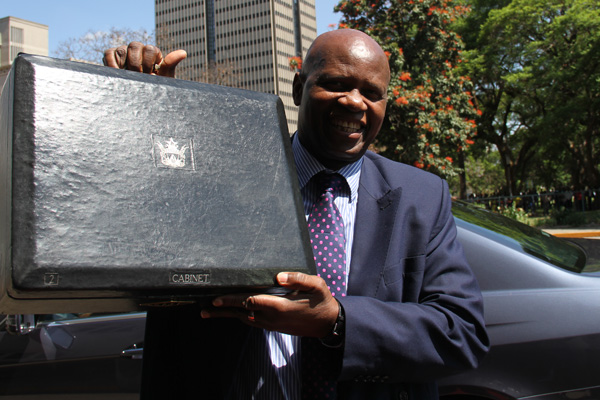
As consultations begin on input into the 2016 national budget, a tax expert has said government should put in place incentives for small-to-medium enterprises (SMEs) and corporates to increase production.
BY TARISAI MANDIZHA
Finance minister Patrick Chinamasa is expected to present the 2016 national budget next month.
Tax Management Services managing director Tendai Mavima said Zimbabwe was one of the highly taxed countries in the world though it had an industry operating at 36% capacity utilisation.

“Generally, the budget should be aligned to the 10-point plan and the Zimbabwe Agenda for Sustainable Socio-Economic Transformation [Zim-Asset]. We should be able to achieve quite a number of objectives, for example, we say we want to promote local investment, but from a tax point of view, we have done nothing to show that we want to promote local investment, especially if you look at issues of value-addition,” he said.
“What deliberate tax policies are we putting in place that the local businesses will be able to take advantage of for us to achieve our national strategy and our national goals?
“The government is of the opinion that if we reduce this tax rate, or if we take this incentive, we are losing, but no, we actually benefit in the long run.”
- Chamisa under fire over US$120K donation
- Mavhunga puts DeMbare into Chibuku quarterfinals
- Pension funds bet on Cabora Bassa oilfields
- Councils defy govt fire tender directive
Keep Reading
Mavima said by putting in place tax incentives for the SMEs, government would be able to receive more revenue through value-added tax (VAT), income tax and pay as you earn from the performing industry.
He added that government should realise that holistically, there were benefits that could be derived from giving certain incentives.
The government has continued to operate in a tight fiscal space where total revenue for the month of February 2015 was at 9,8%, lower than the targeted amount due to underperformance of the various revenue heads.
The informalisation of the economy means that a large chunk of revenue is out of the tax system. Meanwhile, government has failed to tap into the informal sector to boost its revenue coffers.
Zimbabwe continues to face liquidity challenges, a decline in capacity utilisation levels, increasing unemployment levels and reduced government revenues.
Zimbabwe National Chamber of Commerce (ZNCC) past president Luxon Zembe said the objective of the private sector input in the 2016 national budget was to come up with national priorities to address people’s needs .
Zembe said the input should be guided by Zim-Asset and the government’s 10-point plan.
He said Zimbabwe had so far made positive strides in addressing the external debt and re-engagement with the international financial institutions.
The Parliamentary Portfolio committee on Budget, Finance and Economic Development began public consultations countrywide at the beginning of this month.
Public hearings have been slated for Kariba, Karoi, Harare, Chitungwiza, Bindura, Glendale, Murewa, Marondera, Zimunya, Mutare, Masvingo, Chivi, Beitbridge, Gwanda, Bulawayo, Tsholotsho, Victoria Falls and Kwekwe.
The private sector is also conducting consultations countrywide for the ZNCC, Confederation of Zimbabwe Industry and other business representative organisations.
The Zimbabwe Revenue Authority missed its target by 6% in the six months to June after collecting $1,66 billion, owing to the shrinking formal economy. The target was $1,76 billion.
Net collections declined by 3% from the same period last year when $1,72 billion was collected.
In the period under review, VAT on imports, excise duty and carbon tax were the only revenue heads that surpassed their set targets.
Individual tax made up the bulk of the revenue collected in the first half of 2015, contributing 23%, followed by excise duty (21%). VAT on both imports and local sales contributed 13% each.
Individual tax revenue collections amounted to $379, 5 million against a target of $390 million, resulting in a negative variance of 3%.
Chinamasa was forced to review downwards his 2015 budget to $3,6 billion from $3,99 billion.











